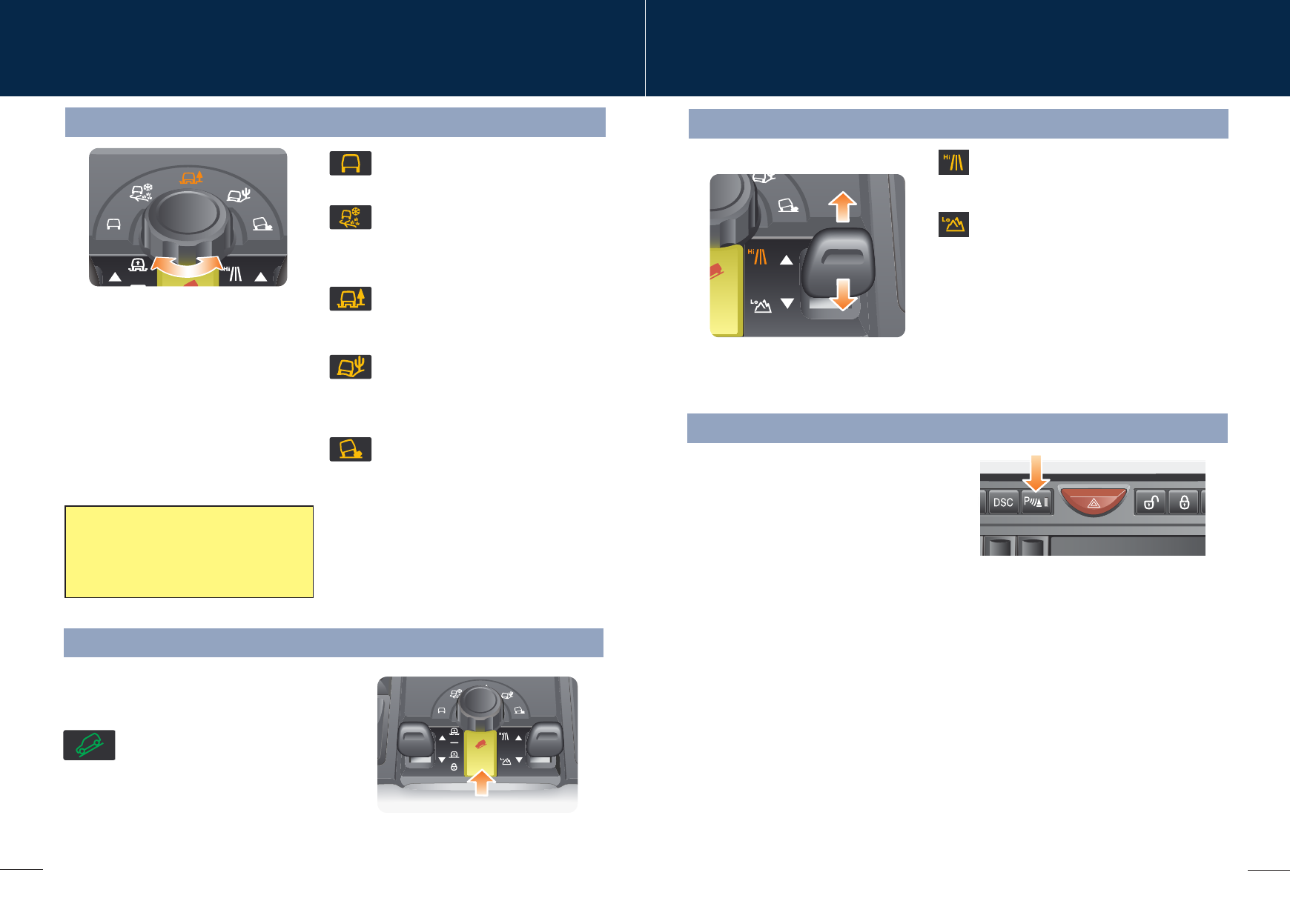
Terrain response system
14
15
On-road and off-road
The Terrain Response system is always
active and cannot be switched off. When
the vehicle is started the system will
normally start in the General program.
Manual selection of a special program, by
rotating the knob, will provide benefits in
how the vehicle can be driven over different
surfaces or terrains by automatically
adjusting the vehicle’s drive and suspension
systems.
It is recommended that a special program
be engaged whenever driving conditions
could become difficult, and cancelled once
the conditions for use are no longer present.
General
Suitable for surfaces that match typical road
surfaces.
Grass-Gravel-Snow
Suitable for surfaces which are firm but
have a slippery surface, e.g. grass, snow,
loose gravel, pebbles or icy conditions.
Mud-Ruts
Suitable for soft, muddy, uneven or deeply
rutted ground. It is recommended that LOW
range is selected on the Transfer gearbox.
Sand
Suitable for soft, predominantly dry, yielding
sandy ground, e.g. sand dunes and
deserts. If the sand is damp or wet, the
Mud-Ruts program may be more beneficial.
Rock Crawl
Only selectable when the transfer gearbox
is in LOW range. Suitable for crossing wet or
dry, solid unyielding ground requiring high
levels of wheel displacement, e.g. clusters
of boulders or rocky river beds.
Wading
When wading through water, select the
program suitable for the surface beneath the
water. The maximum depth of the water
should not exceed 600 mm (24 inches).
Hill Descent Control (HDC)
HDC operates in conjunction with the anti-lock
braking system to provide greater control in off-road
situations particularly when descending severe
gradients.
Press the switch (arrowed in illustration) to
select HDC. HDC can be selected at speeds
below 80 km/h (50 mph) but will not be fully
active until the vehicle speed reduces below 50 km/h
(30 mph), confirmed by a continuously illuminated
HDC indicator in the instrument pack.
Press the switch again to deselect HDC.
Transfer gearbox
HIGH range should be used for all normal road
driving and also for off-road driving across dry
level terrain.
LOW range should be used in situations where
low speed manoeuvring is necessary, or in
extreme off-road conditions.
Range changing
The recommended method for range changing is with
the vehicle stationary. With the engine running, and the
main gearbox in N (Neutral), move the transfer gearbox
lever to the required position and then release. The
indicators on the switch and instrument pack display will
flash during range changing. When range changing is
complete a chime will sound and a message will be
displayed on the message centre.
Parking aid
With the ignition on, the front and rear parking
aids are activated whenever reverse gear is
selected. A short confirmation tone will sound
after one second.
If an obstruction is detected by the sensors, an
intermittent tone will sound (higher pitch for
objects detected by the front sensors). As the
vehicle moves closer to the obstruction the
intermittent tone increases in frequency.
When the distance between the sensor and the
obstruction is less than approximately 30 cm
(1 foot), the tone becomes continuous.
The parking aid is automatically switched off
when the vehicle’s forward speed exceeds
16 km/h (10 mph).
Front parking aid - manual operation
When driving into a limited space, the front
parking aid can be manually activated by
pressing the switch on the facia. The switch
will illuminate and a short confirmation tone
will sound.
23













